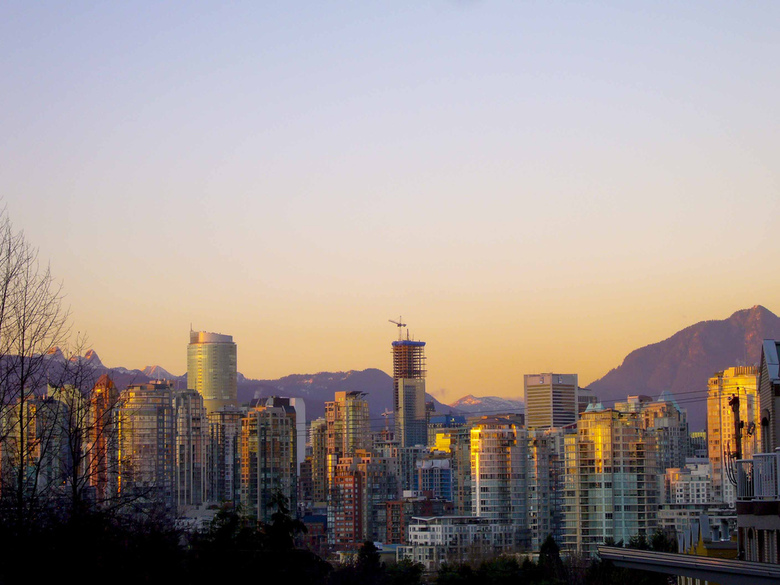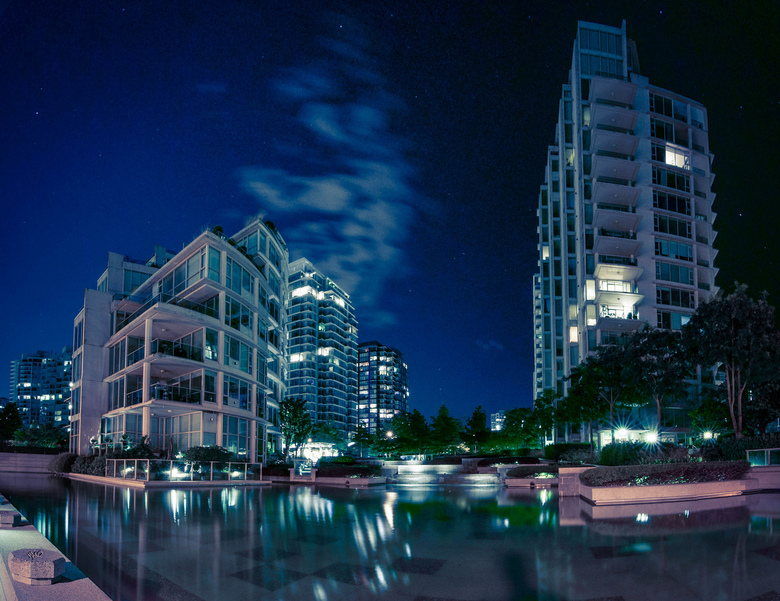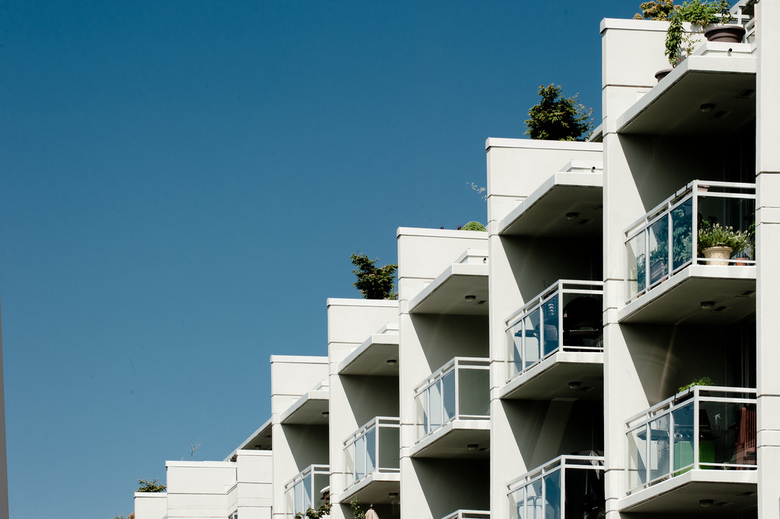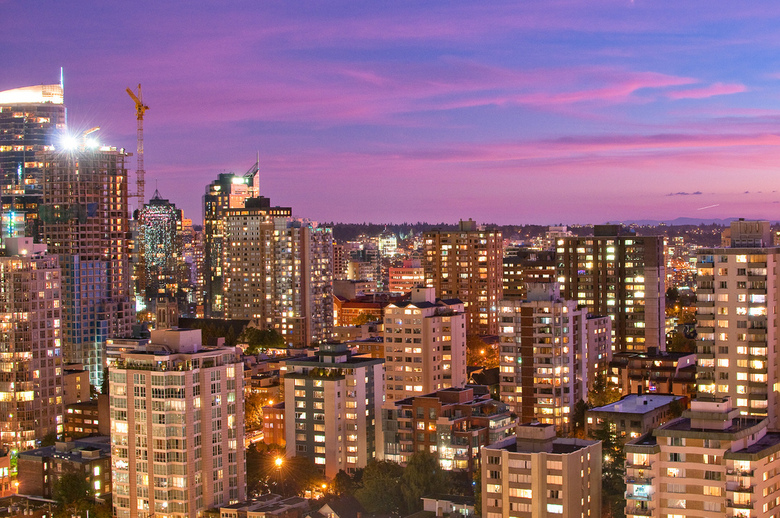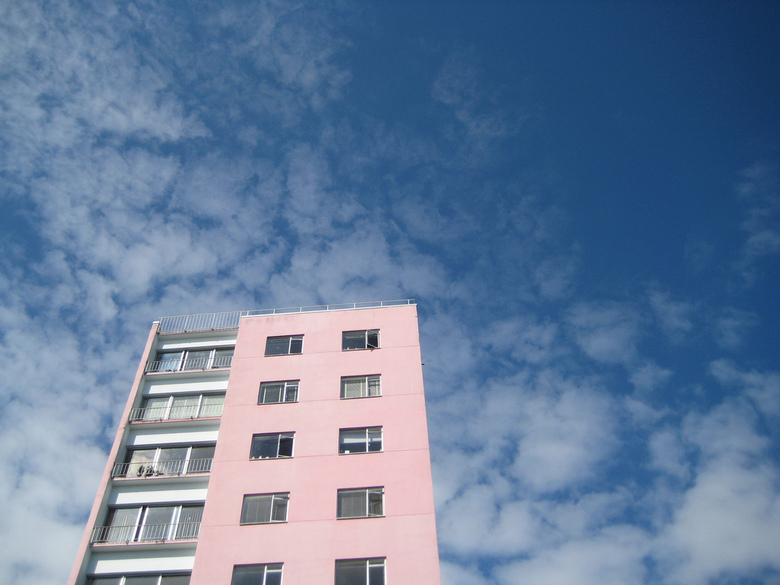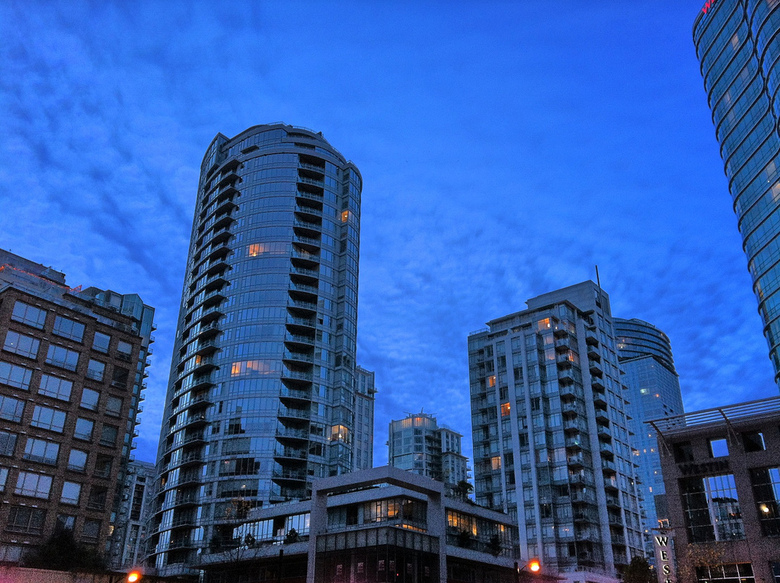As Vancouver housing prices continue to rise, more and more people are turning their attention away from detached homes and towards condos. According to the Real Estate Board of Greater Vancouver, the median price for a detached home in Metro Vancouver rose to $1.2 million last year. In contrast, the average condo was priced at $435,000. This means that many people who have never lived in a condo before will likely be making the transition from a detached home to a condo as they look to reduce their housing costs. What many condo shoppers don’t realize, however, is that moving into a condo is much different than moving into a single family home. So while on the surface, the price of a condo may look better than the price of a detached home, there are several other factors to take into consideration before you decide that the condo lifestyle will be the right lifestyle for you.
 Vancouver Skyline by Paul Joseph
Vancouver Skyline by Paul Joseph
Not Your Average Family Home
Brenda Kinnear, associate broker with RE/MAX Crest Realty Westside in Vancouver, has helped many people make the transition from detached houses to condos, and vice-versa. She says that the most common thing people overlook when shopping for a condo is the fact that they are entering into a group project.
The balcony, the parking, the grounds, the hallways, the rooftop, the heating system, the elevators - everything is common. So as a group you have to agree on how to maintain it, how to use it, what the rules are,
she says.
This may not seem like a major issue at first, but many people change their perspective once the idea of group decision making starts to affect them.
 Coal Harbour Condos by Colin Knowles
Coal Harbour Condos by Colin Knowles
The big issues over the last few years have been replacing hot water systems and replacing elevators,
Kinnear says. If a strata council has neglected to perform regular maintenance on their elevator, for example, an unsuspecting buyer could suddenly be saddled with a hefty bill for their portion of the replacement costs, even though they had nothing to do with letting the elevator fall into disrepair.
Another common issue is parking.
People think ‘oh that’s my parking space,’ but guess what – it’s not,
Kinnear says. In most cases, she says, parking spaces are owned by either the strata or the developer, which means that your space could get moved at any time without your consent.
Beyond the inconvenience of moving to a new parking space or paying for a new elevator is the deeper concern that the value of your investment is tied into the management of the building.
With some buildings, people will buy instantly because they know the building’s well run and it’s a good building,
Kinnear says. On the other hand, if you buy into a building that’s poorly run, you may have a hard time selling your unit, and the value of your property could decrease, even if you keep your unit in good shape.
 Patios by Kenny Louie
Patios by Kenny Louie
The Condo Shopping Dilemma
Recent market research from Urban Analytics shows that the current demand for condo units in Vancouver outweighs the city’s supply. In addition to driving condo prices up, this shortage of space means that there’s now more competition than ever for each unit. This leaves many buyers feeling pressured to not only act quickly, but also make their offer as appealing as possible.
A lot of times people are pressured to remove things from their contract because the next person will have a cleaner contract,
Kinnear says. Buying a condo without including the standard protection clauses in your contract can be a big mistake, she says.
You owe it to yourself to do your due diligence and not be pressed to make a decision that might have financial repercussions you’re not prepared for.
 Almost on Top by Kenny Louie
Almost on Top by Kenny Louie
Another concern is that buyers can feel pressured to work directly with listing agents, rather than going through a buyer’s agent, in order to speed up the transaction process and snap up a unit before someone else does. While some people think they can get a deal by buying directly from the listing agent, Kinnear says this is rarely the case, and in fact, trying to get a deal this way could put you into a dangerous situation. "If you’re buying from a listing realtor you’re not really protected," she says.
You need your own realtor who’s in an agency agreement with you. This means that your realtor is assuming legal liability for the deal, and that you will be covered by the realtor’s errors and omissions insurance in case anything goes wrong with the contract.
Getting a Feel for the Building
Before you even begin to think about the transaction, Kinnear recommends doing everything you can to get the feel for a building to make sure you’ll be making a smart investment. This can mean anything from reading through the minutes of previous strata council meetings to asking people in the lobby how they like the building.
"Buyers are allowed by law to get two years of strata council minutes," she says. Reading through the minutes can tell you a lot about a building. For example, what sorts of complaints are brought up? Are issues dealt with quickly, or do they seem to drag on for a long time? The problem, however, is that "most strata councils skirt [issues] as much as they can," Kinnear says. "They don’t want to have a big fight in the minutes."
 Icecream Condo by Carolyn Coles
Icecream Condo by Carolyn Coles
Other useful sources of information about a building are documents like engineering reports and depreciation reports. As a buyer, you’re also entitled to look over these documents, Kinnear says "but you have to ask for them." These types of documents will contain information about what sort of shape the building is in, and what sorts of repairs can be expected in the near future. In some cases, there may not be a depreciation report available, which is a red flag, Kinnear says.
If [the strata council] doesn’t want to do one, you have to wonder. It devalues the property by not doing it.
Another important document is Form B, which provides information about the building’s financial situation, as well as information about how many units are being used as rental properties, what sorts of policies exist around pets, and so on. This can help you determine how well the building is being managed, as well as what the demographics of the building look like.
 Condo Towers by Kyle Pearce
Condo Towers by Kyle Pearce
If you favour a personal touch, you could even consider spending some time in a building yourself before purchasing a unit.
Lots of times I’ve had clients talk to people in the lobby or in the hallway and ask them if they like living in the building,
Kinnear says.
The bottom line is that if you’re making the transition to the condo lifestyle, or even moving from one condo building to another, you need to do your homework to ensure you know what you’re getting into. Since a condo is ultimately a group project, some aspects of how the building is run will be beyond your control, so if you want to make sure you’ll be happy in your new home, you’ll want to make sure you’re joining a community where you feel welcomed and included in the decision making process. Or, to put it simply, as Kinnear says,
you’re part of a hive and you’d better like the queen.
CW00DT
